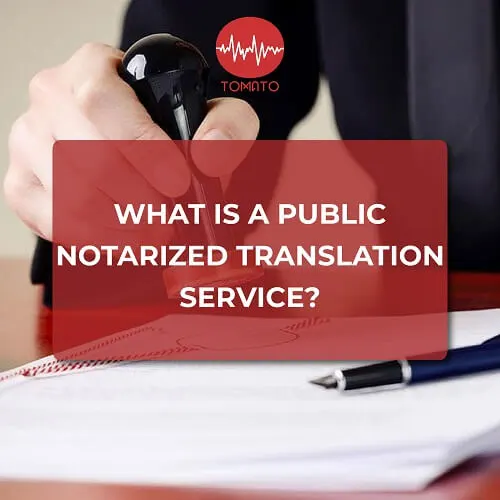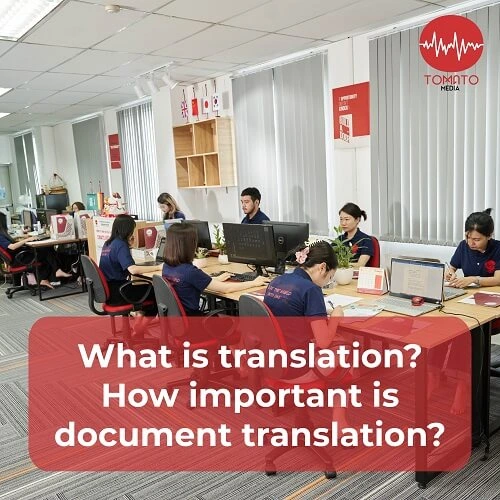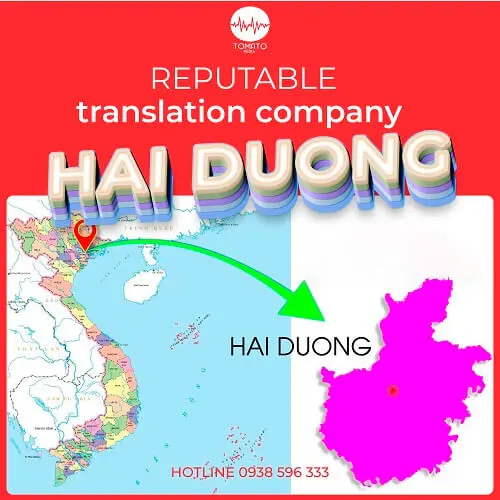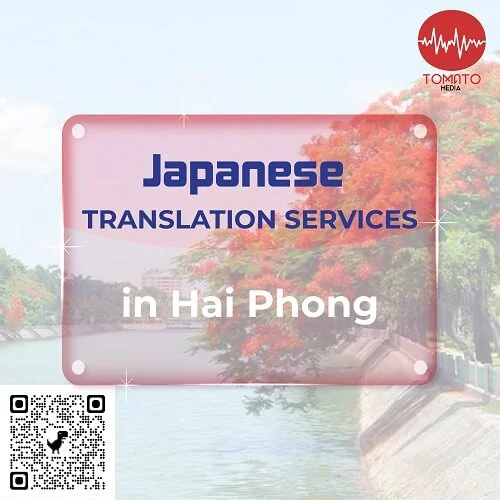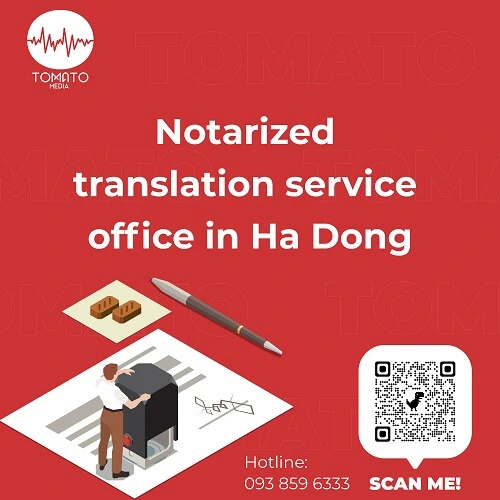The public notarized translation service at Tomato has received countless requests from customers. A notarized translation service is one of the most familiar services for many people when carrying out procedures like visa applications, study abroad procedures, marriage abroad registration, etc. There are many forms of notarized translation, but public notarized translation is the most [...]
Summary of important English translation skills you need to have
Because English is widely used in the world, many valuable documents and books are written in this language. The need to expand exchanges and cooperation with English-speaking partners is increasing day by day, leading to the need for English translation. To get quality translations, you need to acquire certain English translation skills.
Tomato is also a high quality English translation company, please contact Tomato Media immediately if you need services:
NỘI DUNG (CONTENT)
English translation skills – translation
In order for documents, papers and books to be translated smoothly and easily to be understood, and to meet language and cultural factors, translators need to have the following English translation skills:
1. Language skills
This is the prerequisite for an English translator. You need to have knowledge of English, such as vocabulary, grammar, slang, etc., to accurately and fully express the content of the original text.
2. Knowledge of the specialty to be translated
Each major has an extensive vocabulary and strict requirements for an accurate translation of the terminology. Translators need to have an in-depth knowledge of one or more fields.
3. The ability to look up information
In the process of translating, there will certainly be times when you come across ambiguous words. At this time, English translators need to learn to use dictionaries as well as other translation support tools to quickly and accurately look up meanings.
4. Flexible use of translation methods
Although you can read and understand the original content correctly, if you do not know how to express it properly in the local language, the translation will not meet one of the criteria of a quality product, which is accuracy. An accurate and smooth translation is the result of the flexible application of translation techniques such as adaptation technique, equivalent technique, reverse technique, forward technique, etc.
5. Understanding mother tongue
To translate well, the translator must have a thorough understanding of the mother tongue in addition to mastering the target language. Instead of translating each word roughly, translators need to be flexible to give the most concise and soulful expression for the translation. In addition, the use of accumulated practical experience is also one of the factors that bring success to the translation.
6. Cultural savvy
When translating content from the source language into English, you will face cultural barriers. For example, in British writing, the title and last name of the recipient are usually used, but the first name is rarely used unless it is a very close friend. Besides, they do not use slang or alliteration in textual expression. Therefore, having knowledge of the cultures of the languages will help you choose a way to express yourself skillfully, closely, and in accordance with customs and traditions.
7. Office skills
Translators need to improve their office skills to improve translation speed, look up words through applications or software, or meet other requirements of translation and customers. Improving office skills helps increase translation efficiency and work management.
You can sign up for professional English translation services at Tomato to collaborate with a group of experts who have at least five years of experience and strong English translation abilities.
English translation skills – interpreting
The translation is also a difficult field, requiring many factors. Therefore, successful interpreters need to have the following English interpreting skills:
1. Listening, Thinking, and Expressing Skills
This is a key skill group for interpreters and requires translators to practice regularly to achieve. When interpreting, the brain is divided to do two things at the same time: to hear and understand the meaning of the message in one language, and at the same time to convey that message in another language.
Being able to hear well is not enough. An interpreter is required to have the ability to fully understand, evaluate, and translate the original message into the target language.
Not only does the ability to listen well, but interpreters need to be able to understand, evaluate, and select essential information for translation while ensuring that there is no change in the meaning of the original message.
2. Ability to use vocabulary flexibly
A rich vocabulary is a must for an interpreter because when interpreting directly, especially in the form of cabin interpretation, they need to react quickly to the content they hear and translate it immediately. There will be no time to look up or ponder which words to use.
Therefore, possessing a large vocabulary and the ability to react quickly to use words flexibly will be essential. This helps the interpreter to become adept at using words, translating correctly and closest to the content.
3. Understanding different cultures
Similar to translation, interpreters also act as a bridge to remove language barriers so that the parties can understand each other, connect, and bridge the cultural gap. When communicating, the British speak moderately, control their voices, don’t speak too loudly, don’t overact, and lower their voices at the end of a sentence. Therefore, you need to cultivate cultural understanding to skillfully select words and suitable expressions in this language.
4. Professionalism at work
This is one of the essential soft skills that help you build trust with customers and partners. You should show professionalism through punctuality, courtesy, responsibility, discipline, honesty, and confidentiality of project information.
5. Know how to manage emotions
Interpreters work in environments with sensitive situations such as criminal trials, emergencies, disputes, etc. At this time, they need to keep a strong spirit to always be firm in terms of reason and emotion. When translating, the interpreter absolutely needs to honestly convey the exact content without adding any emotions or personal comments.
6. Diligently cultivate knowledge
Interpreters need to regularly update their vocabulary and cultural knowledge to strengthen and improve their personal knowledge. In addition to having a good interpreting session, before proceeding with the work, take the time to refer to many documents and dictionaries for the best preparation.
7. Connect with people
Interpreters are likened to a bridge for people with language barriers. Therefore, a good translator in addition to good foreign language skills also needs to have the ability to connect with many people. Regularly hone your IQ and EQ to remove language barriers and bring people from different cultures closer together.
Freelance translators need both English translation skills and good soft skills.
The freelance translation is being viewed as a “money-making” profession. However, not everyone can do well as a translator if they do not master the following English translation skills and soft skills:
1. Branding skills
If you want to be a professional freelancer, first you need to build a personal brand on the Internet. Show your clients that you are professional and trustworthy. You can build a website about your service or create a blog to share your English translation knowledge. These are the most effective ways to build a personal brand.
2. Quotation skills
Set a price commensurate with your expertise and performance. Do not price it too low or ask too high compared to your knowledge. Identify yourself and your customers to offer the most reasonable price.
3. Negotiation skills
Let’s mediate the discussion to get the project moving in a win-win direction. Negotiation is an essential skill so that freelancers in the English translation industry can get the most benefit, whether for written or spoken translation.
4. Time management skills
This is one of the important skills that help you to receive multiple projects at the same time but still ensure the progress and quality of the work. You need to have a specific translation plan to determine your capacity and, from there, an orientation on the number of projects you will receive at a time. In addition, if you feel that you cannot handle all the work that can be done by outsourcing alone, it is important that you strictly manage the quality of these workers.
5. Task management skills
Try to complete the project as soon as possible. If you can deliver the product earlier than expected with guaranteed quality, your reputation will be enhanced and you will have time to receive more projects. other judgment. If you have a team of freelancers to translate, you need to understand each member well to be able to divide the work accordingly.
6. Customer care skills
Always consider the customer as a friend, and after completing the project, don’t just take the cost and cut off contact, but spend a lot of time continuing to maintain the connection with the customer. You can inquire about translation quality, suggest a translation warranty if there are errors after handing over the product, or discuss other issues outside of work if the customer needs it. A freelancer with good after-sales service will win the hearts of customers. If you do this well in customer service, you will gain loyal customers as well as new service users through the previous ones.
Tips to improve English translation skills firmly, quickly, and firmly
To get a standard, readable, comprehensible English translation, you need to master the following tips:
1. Study the material carefully
Before starting to translate, spend a lot of time reading the document, highlighting difficult or unclear passages. You need to be aware of multiple meanings and different ways of expressing a word or phrase.
2. Mastering grammar and style
English has differences from Vietnamese in terms of vocabulary, sentence structure, and grammar. Therefore, you need to master this difference between the two languages to be able to correctly translate the content with wording that matches the thinking of the local readers.
3. Avoid the rough literal translation.
To understand the meaning of the document, you need to understand the content in each sentence and each paragraph, not diligently translate each word. Such a translation will make the translation rigid, inauthentic, and devoid of emotion. In addition, translators need to be selective to retain the necessary content as well as omit unnecessary ideas. However, this process also needs to ensure the accuracy of the original.
4. Limit the use of uncommon words
You should only choose words you know well and think that even a general reader can easily understand. Translators should not use words that are too sublime, which will make the translation not close and even difficult to understand.
5. Don’t use too many synonyms
The overuse of synonyms causes the translation to become fragmentary. Besides, you should split it into short sentences for easier translation, but make sure that when recombining, the meaning of the paragraphs is not changed compared to the original content. In addition, sentences need to have continuity and cohesion. At the same time, the style must be clear, concise, and highly accurate.
6. Use words that are appropriate for the context
Pay attention to the situation and context of the sentence to translate it correctly and not lose the meaning the author wants to convey behind it. Besides, you can also change the word order, and add or remove words or sentences to suit the style and culture of the target language, but make sure not to affect the accuracy of the original text.
7. Constantly improve English and cultural knowledge
In addition to general English, you should study English in many different fields. Besides, you should also spend time learning about the culture of many localities to be able to translate better.
8. Regularly practice English listening and speaking skills
You can watch movies, listen to music, listen to podcasts, and read the news in English to hone your listening skills. At the same time, spend time participating in English clubs or communicating with foreigners to improve reflexes and practice pronunciation for later translation purposes.
9. Take time to read
The best way to make your translation language contemporary and relevant to that context is to read as much information and material in the foreign language as possible. You can improve your vocabulary and expressions through newspapers, books, magazines, and other local publications. This helps you stay up to date and assimilate facts, cultural nuances, new trends, and terminology specific to each language and field of study.
Besides, you can also read the translations of senior translators in the profession to learn and draw on your own experience, tips, and tricks.
Some tools to help improve English translation skills
Besides learning and practicing English translation skills and soft skills, you need to spend time learning how to use useful English translation support tools. Here are the top 10 quality English translation support tools that we have carefully selected.
1. English translation tool Trados
This is a popular English translation tool in Vietnam thanks to its ability to translate accurately at a rate of close to 98% compared to the original. In addition to the translation feature, Trados also supports users to manage information content, documents, specialized terms, proofread, edit, etc. simply and quickly on many different operating systems.
2. Wordfast software
This tool allows you to translate about 17 different languages. Besides the function of memorizing and storing translated words, Wordfast also allows the formatting and segmenting of text. The biggest advantage of this tool is that you can use it completely for free but still ensure full features.
3. Google Translate translation support tool
This tool supports translation to hundreds of languages in the world with text lengths of up to 5000 characters. The accuracy of Google Translate is increasingly appreciated. In addition to looking up meanings, you can use this tool to correct typos, learn pronunciation, and see synonyms and antonyms.
4. Microsoft Translator software
With similar features to Google Translator, this tool can support translation into 70 languages. This software has outstanding features such as: allowing you to translate words; translating paragraphs quickly and accurately online and offline. In addition, the tool supports voice translation, text recognition, and image recognition. In particular, with the Conversation Mode feature, it helps translate your and other people’s words directly through the microphone to communicate more easily with foreigners.
5. KOOL Dictionary
The main function of this tool is to look up the meaning of words and see synonyms and antonyms. In addition, KOOL Dictionary also allows you to add new words to enrich your own dictionary. You can also learn pronunciation with this software thanks to the standard voice, automatic pronunciation, and repeat function.
In addition to learning the meaning, you can also learn more about pronunciation with this software. With a standard voice and automatic pronunciation and repeat function, the software will support you in pronouncing correctly or like a native.
6. Adept Translator Pro (Vietnamese to English)
This is PC software that enables users to translate long paragraphs from Vietnamese to English with guaranteed quality and fast speed. With this software, you can interpret words and phrases, translate words in context, and improve your foreign language skills effectively.
7. QTranslate translation software
The advantage of this tool is that it has a light capacity and an easy-to-use interface that helps users look up dictionaries and check spelling errors quickly and accurately. QTranslate also has a very unique feature that converts text into audio to practice pronunciation as well as supports users to save translation memory for review.
8. Professional English translation software PROMT Master
PROMT Master is highly appreciated for its convenience and excellent translation ability, helping you translate documents in more than 16 languages even when you do not have an Internet connection. You can compose documents in PowerPoint, Word, Excel, Outlook, etc. and translate them with just one click. Besides, the software supports many file formats such as DOC, DOCX, PDF, RTF, XLS, XML, XLSX, etc.
9. Fluency Now Professional
This is specialized English translation software used by professional translators to improve work efficiency. The software has the following features: data storage, translation progress management, and bilingual text export.
10. SmartCAT
This is one of the cloud-based translation solutions that is considered easy to use and supports free and fast translation into English. In addition to the translation function, you can use SmartCAT to pay if you hire translators and interpreters for your project.
Having a good translation requires you to have a lot of English translation skills. If you are not confident in your ability, you should ask for the help of experts or translation services to be able to translate quickly and accurately.
| Ready to get started? |
Have a large project? |
| GET A QUOTE NOW >> | ✉ CONTACT US |




